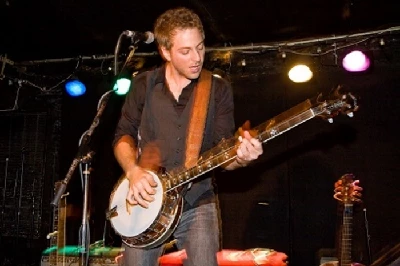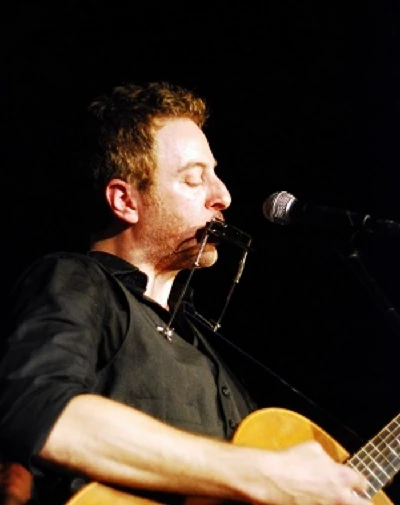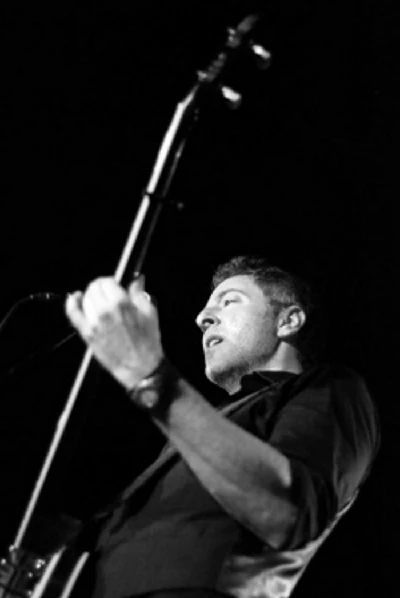published: 18 /
5 /
2011

In his second interview with Pennyblackmusic, New York-based singer-songwriter Andrew Vladeck speaks to Lisa Torem about his latest EP ‘Passing Knowledge’,which takes its main influences from traditional American acoustic folk music
Article
Andrew Vladeck and I first crossed paths after I reviewed his album, ‘The Wheel’ and he elaborated on the motivations and finer points of that project. It was soon after listening to this multi-instrumentalist’s release – Vladeck is adept at guitar and banjo - that I discovered his penchant for spoken word, rhyme, and love of contrastive imagery. And, although Vladeck possesses an innate ability to imitate Springsteen or Dylan, his homegrown, distinctive growl sets him apart.
His newest project, a six-song EP, ‘Passing Knowledge', which is accompanied by a psalm-like, pocket book of lyrics and other writings, hearkens back to traditional American acoustic folk, allowing the New York singer-songwriter to laud his finely honed lyrics.
Vladeck swept away judges, such as Tom Waits and Brian Wilson, in an International Songwriting Competition, in which he came in first place.
He begins his second European tour this spring, starting in Germany, but took the time to unlock the mysteries of his most recent undertaking.
PB: Hi Andrew. We haven’t been in touch since your first release in 2008, ‘The Wheel’. With ‘Passing Knowledge’, your new EP, your thoughts seem to be divided between celebrating physical places that mean a lot to you, ‘Coney Island’, ‘St. Petersburg’ and a more cerebral, romantic sensibility. Is that true or do you think that place and mood are inseparable?
AV: I think we all make associations based on our experience. Often times it's booze that reminds me of a particular place and person (and a generally fond memory!), although I don't sing of booze often. Maybe I should.
Places will remind me of people and vice-versa, and that's a lovely thing. In the end, it's all about the quality of the experience. Hopefully the listener doesn't have to have gone to Coney Island to know what I'm talking about: it can become something universal. Someone will hear my story about Coney Island and it will make him or her think of someone special at Brighton Beach, or the like. But yes, for me, the place and mood become inseparable!
PB: The first song, ‘Living the Dream’ is quite powerful: “We squinted and stared, and we speechlessly spoke”, “We inhaled pink clouds of the sunset, as it swallowed us.” I think you have captured the essence of dreams, because they can be lovely or they can control us.
AV: Thank you! My favourite moments are when reality becomes dreamlike. That often has to do with the quality of the light, like during a partial solar eclipse. I always try to have a pen and something to write on in those moments.
PB: In the song,’ Passing Knowledge of the Sexes’: “Men yearn for a soul mate, woman want the occasional thrill.” What inspired this lyric and do you feel that, in this age of internet dating, many people find themselves grappling with intimacy?
AV: The song was inspired by, of all things, a passage from the book ‘Freakonomics’. The line is a cheeky reversal of accepted truths, since generally the opposite is thought to be true.
In this age of Internet dating.... of Internet everything, I think everyone is grappling with the sense of themselves, let alone others. It's such a bizarre time, where many of us are still learning how to manage it, how to relate to it.
Are men more committed to finding a “soul mate” than woman? I don't think so. I was just trying to get people's attention!
PB: ‘Coney Island’ contains some jangly instrumentals that juxtapose some very direct lyrics. Which instruments were used to create this irony?
AV: I'm playing a banjo with a glass slide. The other featured instrument is cello – a beautiful part arranged and performed by Colette Alexander.
PB: I’m guessing that ‘Within Reach’ is very personal. It is about a long-distance relationship, isn’t it? “Your eyes are as bright as the night that we met…”
AV: I'm glad it has that meaning for you. I wrote it about a totally different experience, but as long as it means something to someone, I'm happy. I like that a song can occasionally be open enough for people to impose their own frame.
I wrote it about my teenage infatuation with Heather Locklear. Just kidding. I wrote it about my grandparents, Frieda and Harry, the sweethearts of the Bronx. Hope that doesn't ruin it for ya.
PB: Not at all. It’s good to know that love is eternal. “The moon burns a hole through the clouds I wait underneath/The breeze blows the stars though your hair/Soon you’ll be within reach.” I have to say that your voice grows softer in this song, even resulting in a falsetto.
AV: My whole life I've keep trying to sing better - that is, in ways that makes emotional sense and don't sound affected. This is my latest attempt.
PB: ‘St. Petersburg’ has instrumental passages that fluxuate between almost a music box melody and then a swinging samba; quite a dramatic shift. How did you arrange this tune?
AV: I wrote the song with Morgan Taylor of Gustafer Yellowgold, but it wasn't until I adapted it years later, to a finger picking style, that the little melody came out. And, for some reason, the song just cried for a sexy samba at that point. It's a sexy song, but restrained, and when the bridge comes along it seems like the right time to go with it.
PB: Andrew, your relative, David Bromberg, an American folk musician, influenced you. What was it about his music that specifically captivated you? Also, since the release of “The Wheel” and your touring engagements, would you say that your influences have changed?
AV: I was inspired by old folk music from the 1920s-1940s, for the most part. David Bromberg showed me that it was possible to reinterpret in a way that was meaningful, and even put a new spin on it to make it relevant to one's own life. More than that, since he's a blood-relative, it gave me hope that the possibility to do this was within me.
PB: With your new EP, there is a lyric booklet that pays homage to beat poet Allen Ginsberg. Can you explain this connection and whether other literary works served as inspiration?
AV: Wow, I gotta hand it to you for a thorough interview! As a New York daydreamer, rambler, poet and songster fella, Ginsberg is a huge model. I think any existential writer, searcher, etcetera, has got to come across his work at some point. He certainly serves as a general inspiration, and almost every song I'm writing these days is inspired by a different book or piece of art. The upcoming record really captures that.
PB: Misha Volf is listed as producer on ‘Passing Knowledge’,but he also contributes as an instrumentalist. How did you two develop the ideas for the EP?
AV: When I was looking for an engineer/producer Misha came by, and it was clear that he was a genius. His musical sensibility combined with his technical knowledge makes him the ideal person to work with. He took my songs and ran with them, figuring out nice parts and sounds and ideas that complemented what I was going for beautifully.
PB: Your touring schedule will take you to Germany and Belgium this May. What does the future hold as far as touring additional countries? Will you be playing festivals too?
AV: One can only hope! I'm new to playing Europe, so each visit things are building.
PB: Finally, as the title of this new release is ‘Passing Knowledge’, what is the most important lesson you have learned in your life?
AV: All I know is that you never really know, until you know. You know?
PB: Thank you.
Picture Gallery:-

